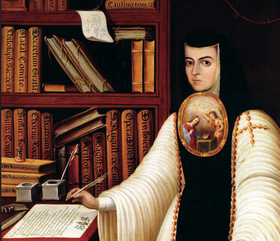Fruta prohibida
|
Forbidden Fruit
|
|
"¿Qué humor puede ser más raro que el que, falto de consejo, él mismo empaña el espejo, y siente que no esté claro? " - Sor Juana Inés de la Cruz |
"For plain default of common sense, could any action be so queer as oneself to cloud the mirror, then complain that it’s not clear?" - Sor Juana Inés de la Cruz (anonymous translation) |
|
Entre volcaneS la vieron nacer
envuelta en dOs climas Nepantla bruja espíritu Rebelde mujer persecución a Juana la santa. Libros con locUra sembraste sin causa sin rAzón solevantas en falsa pose Niña no te conformaste amor música A tu desnudez insensata. Belleza entendImiento en la cabeza no la cabeza siN entendimiento, riqueza verdadEra fue tu perseverancia hombres necioS sin sentimiento. Igualdad y pariDad presagios sin alEvosía y ventaja. Voces como avaLancha de fuego cada vez que unA mujer dice: ¡basta! No más crucifiCadas, madre loca o pRostituta, del amor que bUscas mestizaje de luZ y prohibida fruta. La poetisa Sor Juana Inés de la Cruz, conocida como la Décima Musa o el Fénix de América, es considerada como pionera del movimiento feminista en el continente americano y la primera mujer en ser publicada. Nació en Nepantla, Estado de México en 1651 y murió en 1695 dejando una vasta herencia literaria, entre la que destacan Primero Sueño, la redondilla Hombres Necios y la Respuesta a Sor Filotea de la Cruz. |
Volcanoes bleSsed her nurturing:
Nepantla’s twOfold atmosphere, Soul of a sorceRess, questioning. They hounded Joan, the good, the pure. You sowed yoUr books with lunacy, uncaused unreAsoned mutiny, conforming to No falsity: love’s music, stArk simplicity. Beauty, a brain, Intelligence, without intelligeNce no brain. True riches your rEsilience, all the unfeeling Stupid men. Fairness of genDer parity, impartial, honEst prophecy. Voices, an avaLanche of fire whenever womAn says: no more! Women! be cruCified no more, no deranged motheR, prostitute… That love you soUght, two bloodlines bore: … Christ’s dazZling light, forbidden fruit! Translated by Timothy Adès The poet and nun Sor Juana Inés de la Cruz, known as the Tenth Muse or the Phoenix of the Americas, is considered a pioneer of the feminist movement in the American continent and the first woman to be published there. She was born in Nepantla in the State of México in 1651 and died in 1695, leaving a vast literary inheritance, notably The First Dream, the poem Stupid Men, and the Response to Sor Filotea de la Cruz. |
